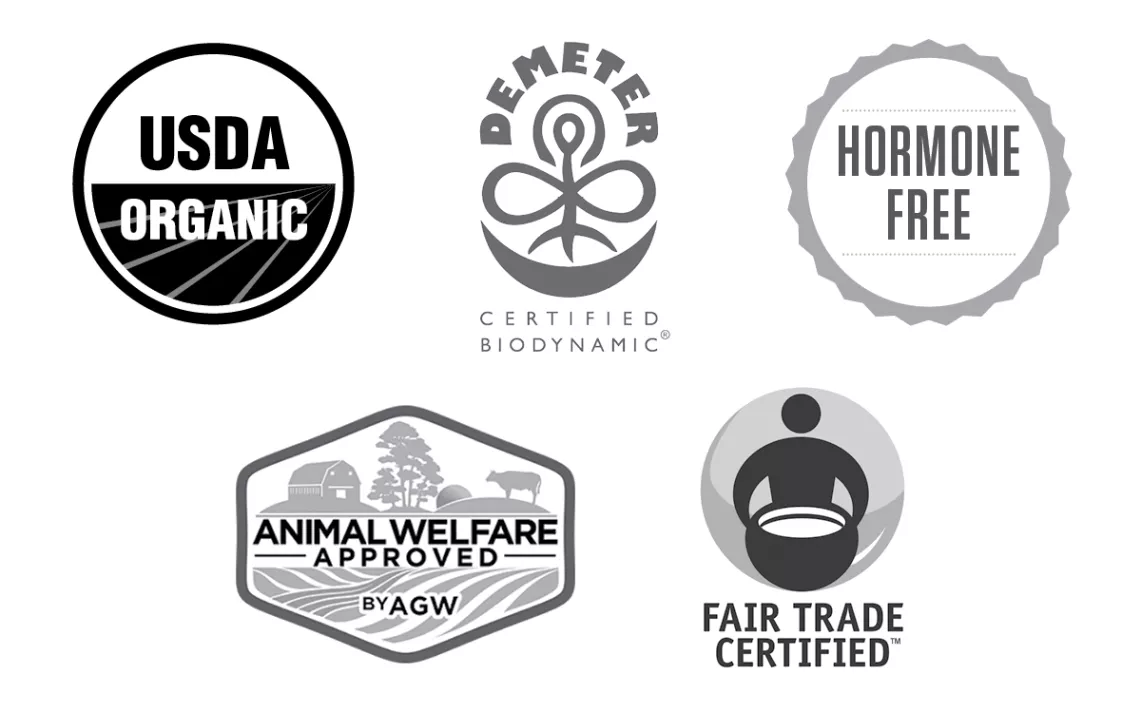Supermarket Decoder: How to Interpret Major Food Labels
Your handy grocery guide to stamps, seals, and more

Illustration by Andrea Mongia
Products vying for attention at the supermarket tout their environmental and moral superiority via food labels. Such stamps and seals can make it tricky to determine which producers' claims are overseen by government agencies or confirmed by third-party certifiers and which are more, well, subjective. So Sierra talked to food experts at Consumer Reports and the Organic Valley co-op to produce this handy grocery store decoder.

LABELS YOU CAN GENERALLY TRUST
Organic
Any product labeled organic (which stipulates outdoor access and organic feed for animals as well as production without GMOs and most synthetic fertilizers, herbicides, and insecticides) must be legally certified by a USDA-accredited agency. Experts say that USDA standards are trustworthy; however, some in the organic community seek more stringent rules. For example, the Real Organic Project wants standards that exclude hydroponic growing and CAFOs, and the Regenerative Organic Alliance would like to apply its own certified label to food from farmers using systems that build healthy, biodiverse soil.
Demeter Biodynamic
USDA organic is the baseline for this independent certification, which is named for the Greek goddess of agriculture and serves to ensure maximal biodiversity and ecosystem preservation, soil fertility, and ethical animal husbandry, and to reward farms that operate as "holistic organisms."
Hormone- and Antibiotic-Free
USDA standards prohibit any use of artificial growth hormones in organic milk or meat. For conventional meat, poultry, and eggs, only claims of "raised without antibiotics," "no antibiotics ever," and "no added antibiotics" are permitted; "no added hormones" is allowed for milk and some meat (since artificial hormones are prohibited in the raising of hogs and poultry, that claim doesn't apply to their products).
American Humane Certified/Certified Humane/Animal Welfare Approved
Overseen by the American Humane Association, the first of these livestock labels doesn't guarantee that animals were pastured or fed nutrient-rich grass, but the certification does prohibit willful acts of abuse. Certified-humane standards include outdoor access for most animals as well as shelter, welfare-oriented slaughter practices, and per-animal space requirements (though experts say that meat chickens might still experience crowded conditions). The animal-welfare-approved certification is the highest rated for meat, meat chickens, and laying hens, ensuring pasturage, sufficient space, and the capacity for animals to engage in natural behaviors. Experts advise caution around other "welfare" claims.
Fair Trade
Showing up on bananas, coffee, and tea, seals for fair trade certification–which aims to foster better working conditions in industries notorious for labor abuse–vary depending on the issuing certifier. Fair Trade USA allows its products to originate on large plantations. Fair for Life focuses on smaller producers and stakeholders.
LABELS TO READ VERY CAREFULLY
Pasture Raised
Unless used in conjunction with an animal-welfare-approved seal, this label doesn't guarantee that there was outdoor access or dietary mandates for any of the meat or poultry bearing it.
Free Range
As a stand-alone seal on a package of chicken or a carton of eggs, this claim could mean a chicken had but a tiny covered porch to explore. But combined with an animal-welfare-approved seal, it typically guarantees some amount of legitimate pasturing.
100% Natural
You can find this label on pretty much everything from produce to meat to vitamins. But according to experts, it doesn't mean anything.
Local
This buzzy word can turn up on almost any product, and it carries all sorts of positive associations for consumers who imagine farmers toiling just over the hill. A few states, including New York, have initiatives that boost in-state products. Otherwise, "local" and traveling parameters are hazily defined by the store selling the product. The label could mean food from 100 miles away or 250, from in-state or across a border.
Certified B Corporation
A B Corp seal, which can appear on anything from beverages to energy bars to eyeglasses, indicates a company that has decided profit isn't its only objective. But did it commit to treating workers fairly, to improving cropland, or to volunteering in its community? The specifics, as they pertain to each company, require research on the part of the consumer.
This article appeared in the May/June 2019 edition with the headline "What's in a Label?"
 The Magazine of The Sierra Club
The Magazine of The Sierra Club







